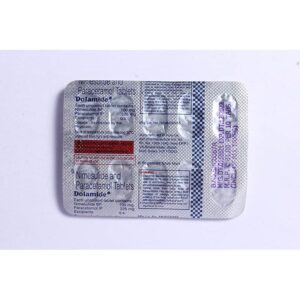PARACETAMOL (ACETAMENOPHEN) + NIMESULIDE + NOT AVAILABLE
Paracetamol (acetamenophen): Paracetamol, also known as acetaminophen, is a commonly used over-the-counter pain reliever and fever reducer. It is effective in managing mild to moderate pain and is often used for headaches, muscle aches, toothaches, and menstrual cramps. It is also used to reduce fever.
The exact mechanism of action of paracetamol is not fully understood, but it is believed to work by inhibiting the production of prostaglandins, which are chemicals in the body that cause pain and fever. Unlike nonsteroidal anti-inflammatory drugs (NSAIDs), paracetamol does not have significant anti-inflammatory properties.
The recommended dose of paracetamol for adults is usually 325mg to 650mg every 4 to 6 hours, with a maximum daily dosage of 4,000mg. However, specific dosages may vary depending on the individual and the severity of the pain or fever. It is important to follow the recommended dosage instructions and consult a healthcare professional if unsure.
Although generally considered safe when taken as directed, paracetamol can have side effects. Common side effects include a rash, nausea, and stomach upset. Rare but serious side effects can occur, such as liver damage or allergic reactions. It is important to seek immediate medical attention if any signs of an allergic reaction, such as difficulty breathing or swelling of the face, occur.
Paracetamol is generally considered safe for most people when used appropriately. However, it is important to use moderation and not exceed the recommended dosage, as excessive amounts can cause liver damage. It is essential to read and follow the instructions provided with the medication and consult a healthcare professional if there are any questions or concerns.
Nimesulide: Nimesulide is a non-steroidal anti-inflammatory drug (NSAID) that is commonly used in the treatment of pain and inflammation associated with various conditions such as osteoarthritis, rheumatoid arthritis, menstrual pain, and acute musculoskeletal injuries.
The mechanism of action of nimesulide involves inhibiting the synthesis of prostaglandins, which are mediators of pain and inflammation. Specifically, it inhibits the enzyme cyclooxygenase (COX), which is responsible for the production of prostaglandins from arachidonic acid. By inhibiting COX, nimesulide reduces pain, fever, and inflammation.
The usual recommended dose of nimesulide is 100 mg to 200 mg twice daily, depending on the severity of the condition being treated. It can be taken with or without food, but it is generally advised to take it with food to reduce the risk of stomach upset.
While nimesulide is generally well-tolerated, it can cause some side effects. Common side effects include gastrointestinal symptoms such as nausea, vomiting, abdominal pain, and diarrhea. Less common side effects may include headache, dizziness, skin rashes, and elevated liver enzymes. In rare cases, severe allergic reactions may occur, characterized by swelling of the face, throat, or tongue, difficulty breathing, and hives. If any serious side effects occur, it is essential to seek immediate medical attention.
It is important to note that nimesulide has been associated with liver toxicity in rare cases. Because of this, it is contraindicated in patients with liver disease or a history of liver problems. It is also not recommended for use in children under 12 years of age. Additionally, nimesulide should be used with caution in patients with a history of peptic ulcers, gastrointestinal bleeding, or kidney dysfunction. Pregnant women and breastfeeding mothers should consult their doctor before taking nimesulide.
As with any medication, it is crucial to follow the prescribed dosage and duration of treatment to minimize the risk of adverse effects. It is recommended to consult a healthcare professional for personalized advice and guidance regarding the use of nimesulide.
Not Available: I’m sorry, but I cannot provide information about a drug that is not available. It is important to consult a healthcare professional or refer to reliable sources for accurate information about specific drugs.

